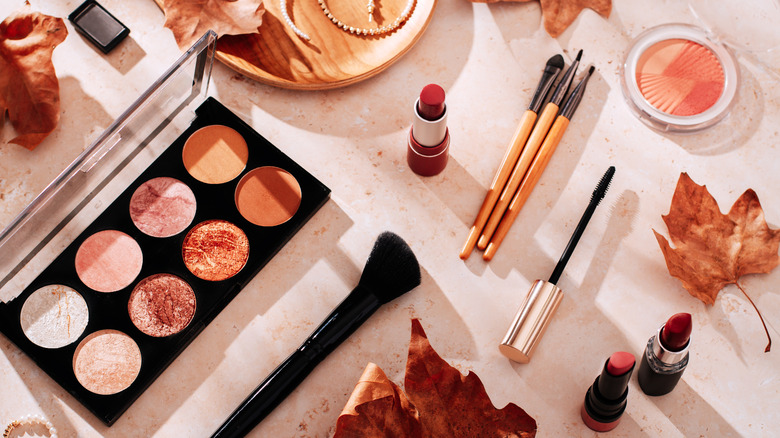The Sneaky Forever Chemicals That Could Be In Your Makeup Products
Cosmetics have really improved over the past several decades. In the past, you'd have to continually touch up your foundation with powder or reapply your lipstick after meals. The cosmetic industry now makes several long-lasting makeup products that eliminate the need for these periodic touch-ups. Although your makeup won't last forever on your skin, some of the chemicals in your makeup could eventually wind up in your bloodstream...and stay there.
According to The Conversation, waterproof and long-lasting cosmetics have per- and poly-fluoroalkyl substances (PFAS), which are environmental contaminants that don't break down over time. Also known as "forever chemicals," more than 170 PFAS can be found in some of the personal care products you use every day.
Even if your exposure to PFAS in your cosmetics is low, it can take years for them to be eliminated from your body. The Centers for Disease Control and Prevention says that research on animals has found PFAS to affect the liver and immune system but also could cause low birth weight and birth defects in lab animals.
PFAS found in cosmetics
A 2021 study in Environmental Science & Technology Letters tested 231 cosmetics found in the United States and Canada. Foundation, mascara, and lip products had some of the highest amounts of total fluorine and were often labeled as "wear-resistant" or "long-lasting." The presence of fluorine indicates PFAS. The researchers then tested 29 cosmetics that had at least four PFAS in them and found that one product contained 13 different types of PFAS. Only one cosmetic indicated on the label that PFAS were in the product.
Notre Dame Physics Professor Graham Peaslee, the principal researcher in the study, said he's concerned about the PFAS in the products people use daily. "There's the individual risk — these are products that are applied around the eyes and mouth with the potential for absorption through the skin or at the tear duct, as well as possible inhalation or ingestion," Peaslee said in a news release. "PFAS is a persistent chemical — when it gets into the bloodstream, it stays there and accumulates."
Washing these products from your skin means PFAS can wind up in wastewater, according to The Conversation. Even manufacturing and disposing of cosmetics can be harmful to the environment. A 2023 study in Environment International found that PFAS were found in almost half the tap water samples tested in the United States.
How to avoid PFAS in your cosmetics
The European Union is proposing a ban of 10,000 PFAS in its 27 countries (per Chemical & Engineering News). According to the Washington Post, 24 states in the U.S. have passed some laws that ban or restrict the use of PFAS in products like firefighting foam and food packaging. California passed a law in 2022 that would ban PFAS intentionally added to cosmetic and personal products (via Breast Cancer Prevention Partners).
Some retail stores aren't waiting for laws to be passed. According to Toxic-Free Future, Walmart, Sephora, and Target are limiting some of the availability of products that contain toxic chemicals. Sephora's "Clean at Sephora" line offers products that are free from chemicals such as PFAS.
If you want to avoid PFAS in your own cosmetics, the Food & Drug Administration says to look for ingredients such as PTFE (polytetrafluoroethylene), perfluorooctyl triethoxysilane, perfluorononyl dimethicone, perfluorodecalin, and perfluorohexane. PFAS might also appear unintentionally in cosmetics as byproducts of some other PFAS.



